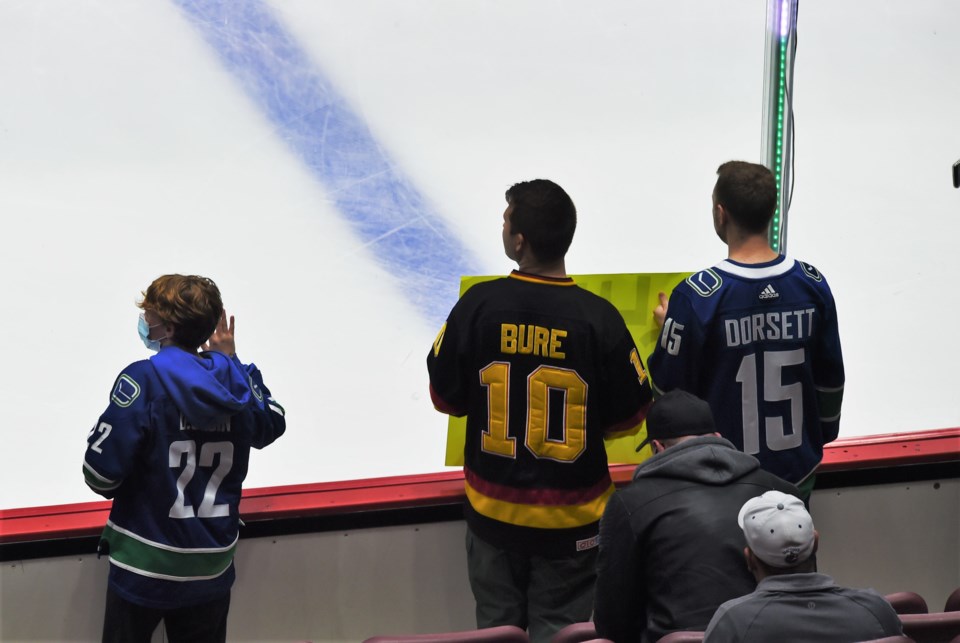The much-ballyhooed meeting between Vancouver Canucks owner Francesco Aquilini and general manager Jim Benning on Tuesday has evidently resulted in no action being taken. TSN reporter Darren Dreger reported that “the plan is to remain patient and continue to work with the team and personnel.”
There’s a certain absurdity of leaking a meaningless meeting to the media during a crisis. It seems performative, saying to the fans, “Look, we’re doing something!” while simultaneously proving that you’re doing nothing.
It seems that the powers that be in the Canucks organization want to wait before doing anything too hasty and are particularly interested in seeing how the players and the fans respond during their three-game homestand that starts Wednesday night against the Colorado Avalanche. There’s a sense that ownership might want to believe that all the negativity is just angry fans on social media and doesn’t reflect the larger fanbase and, in particular, the fans that attend the games in person.
The game against the Avalanche on Wednesday might just be the 17th game in a long, 82-game season, but there’s clearly a lot at stake. Will fans show up or will there be a sea of empty seats? The fans that do show up, will they voice their displeasure with the direction of the franchise or will they stay silent?
Then there’s the play on the ice. It could almost feel like a road game, where the visiting team is looking to silence the fans early, except in this case, the Canucks will be trying to give their home fans something to cheer about before the boos start and the chants calling for the firing of the coach or general manager.
By the analytics, Canucks are one of the worst teams in the NHL
The Canucks could definitely come out firing on all cylinders and play well on Wednesday and perhaps carry that into the remaining two games of the homestand. They’ve had a couple of days between games to practice, meet as a team, and do some soul searching. The players are proud, want to win, and definitely don’t want to face hostile fans in their own building.
Here’s the thing: a few good games should not matter in the big picture.
The result of Wednesday night’s game should not determine the future of a sports franchise worth three-quarters of a billion dollars. Whether the fans boo or cheer at one game should not materially change the perception of a team in turmoil.
The Canucks may not be as bad as their 5-9-2 start — they’re probably not — but that doesn’t mean they’re good or that ownership should be satisfied with the team’s performance and direction over the past eight years.
It’s not just that the Canucks are 27th in the NHL in points percentage this season. Even other metrics show that they are a below-average team.
They’re 20th in score-adjusted corsi percentage at 49.13%, indicating that they regularly get out-shot at 5-on-5.
We can get a little fancier with our stats. The Canucks are 31st — nearly dead last — in score-adjusted expected goals percentage at 44.59%. It’s not hard to figure out why: they’re also 31st in high-danger chance percentage, which means they give up far more dangerous chances at 5-on-5 than they get themselves.
The analytics don’t paint a picture of a good team undone by bad luck or bad special teams. They suggest the Canucks are one of the worst teams in the NHL.
The worst part is, none of this should have come as a huge surprise. It was an open question heading into the season whether the Canucks had improved their roster from last season, when they finished below the rebuilding Ottawa Senators in the standings. The consensus from pundits and analytical models all agreed that the Canucks were most likely going to miss the playoffs and it wasn’t going to be particularly close.
A few good performances won't change anything
Could the Canucks turn things around this season? Maybe. Elias Pettersson surely can’t keep playing poorly forever — we’ve seen how dominant he can be when he’s at his best. The power play has arguably been unlucky and could give the Canucks a few more goals, while Thatcher Demko has the ability to steal games.
It’s even possible that a coaching change could provide a spark and wake up the team.
But temporarily turning things around doesn’t change the underlying issues with the Canucks.
It doesn’t change that the team jettisoned their best defensive defenceman in Chris Tanev and never adequately replaced him. It doesn’t change that Benning has never been able to put together a good defence corps, acquiring the likes of Luca Sbisa, Erik Gudbranson, and Tyler Myers at great cost.
It doesn’t change that Benning went all-in — trading back-to-back first-round picks — to build this team. Trading massive amounts of draft capital to create a team that might make the playoffs, if everything goes right, is a failure.
It doesn’t change that the Canucks don’t have any blue-chip prospects remaining in the prospect pool. This is the team — there’s no sure help on the way.
It doesn’t change that the Canucks under Benning have seemingly never had a long-term plan.
“Our plan has always been to draft and develop a young core and surround them with supporting players who can help us win,” said Benning earlier this year.
It should go without saying that “draft and develop” and “also acquire other players” is not a plan. That’s literally the bare minimum of running a hockey team.
In other words, win or lose, cheers or boos, the Canucks need to make a change. It’s the eighth season with the same GM, the fifth season with the same head coach. The results have been uniformly terrible, except for one deceitful playoff run in the middle of a pandemic bubble fueled by unsustainably good goaltending.
Something has to give.


.JPG;w=120;h=80;mode=crop)

